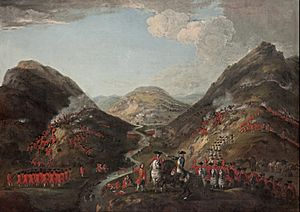Joseph Wightman (general) facts for kids
Quick facts for kids
Joseph Wightman
|
|
|---|---|

A painting of the Battle of Glen Shiel by Peter Tillemans depicting Wightman in the centre
|
|
| Born | c. 1665 |
| Died | 25 September 1722 (aged 56–57) Bath, England |
| Allegiance | |
| Years of service | 1690–1722 |
| Rank | Major-General |
| Battles/wars | |
Joseph Wightman was a British Army officer. He is best known for helping to stop the Jacobite rebellions in 1715 and 1719. He also fought in the Nine Years' War and the War of the Spanish Succession.
Contents
Early Life in the Army
Joseph Wightman started his army career in 1690. He joined the First Foot Guards as an Ensign. An Ensign was the lowest officer rank, like a Second-Lieutenant today. However, officers in the Foot Guards were considered more senior than officers of the same rank in other regiments. This suggests Wightman came from an important family.
Fighting in the Nine Years' War
Wightman's regiment, the Foot Guards, was sent to Flanders during the Nine Years' War. In July 1693, they fought in the Battle of Landen. This was a difficult battle for the Allied forces, and many soldiers were lost. On August 7, Wightman was promoted to Lieutenant.
In May 1695, his regiment was part of an operation in West Flanders. On August 11, they joined the siege of the citadel of Namur. During a very tough attack on August 30, many officers were killed or badly hurt. After this, the regiment spent the winter in Brugge.
Moving to the War of the Spanish Succession
After the Nine Years' War ended in 1697, Wightman's regiment was moved to Ireland. On June 15, 1701, they sailed to Holland. They were stationed in Gorkum. In 1702, the regiment marched to Roosendaal and then to the Duchy of Cleves. They were involved in the Nijmegen affair. Later, they helped in the sieges of Venlo and Roermond.
In 1703, the regiment was part of the action at Loonaken. They also helped protect the sieges of Huy and Limbourg. In October, the regiment sailed from Holland to Portsmouth, England. On March 15, 1704, they landed in Portugal.
Stopping the Jacobite Rebellions
When the Jacobite rebellion of 1715 began, Wightman led the first extra troops sent to help the Duke of Argyll at Stirling. He fought under Argyll at the Battle of Sheriffmuir in November 1715. The battle didn't have a clear winner, but it greatly weakened the Jacobite effort. By the spring of 1716, the rebellion was put down.
During the 1719 Rising, Wightman commanded the forces loyal to the king. His troops defeated the Jacobites at the Battle of Glen Shiel in June of that year.
 | Anna J. Cooper |
 | Mary McLeod Bethune |
 | Lillie Mae Bradford |

